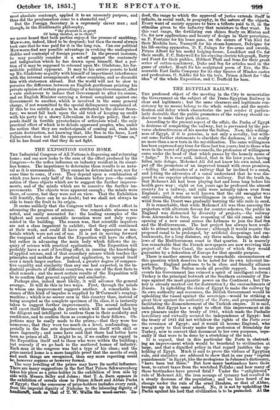THE EXPOSITION GOING HOME.
Tun Industrial Congress of All Nations is dispersing and returning home ; and one now looks to the sum of the effect produced by the Congress—to the reflex influence on industry resident in its count- less homes. The impatience to determine these results is as natu- ral as it is unreasonable. They cannot be determined now, nor for some time to come, if ever. They depend upon a combination of which you have only half of the elements before you—the combi- nation of those objects which are to suggest the further improve- ments, and of the minds which are to conceive the further im- provements. The objects were apparent enough ; the minds were there, of course, but they were not on view. That the Exhibition will fructify, there can be no doubt; but we shall not always be able to trace the fruit to its origin.
It seems unlikely that the Congress will have a direct effect in advancing the progress of science. One remarkable absence was noted, and easily accounted for : the leading exam les of the highest and newest scientific invention were not duly repre- sented in the building. The reason was, that scientific inquirers are not a class impatient to exhibit; that they still continued at their work, and could ill have spared the apparatus or ma- terials which were not out of use. It is not in moving forward the vanguard of science that the Exposition will have its effect, but rather in advancing the main body which follows the in- quiry of science with practical application. The Exposition will probably have a sort of levelling effect, in causing the knowledge of applied science, and of that secondary science which teaches the principles;and methods for practical application, to spread itself over a much larger surface. Indeed, a greater degree of compara- tive equality, and similarity than any one had expected, in the in- dustrial products of different countries, was one of the first facts to elicit remark ; and the most certain results of the Exposition will be to confirm that general equality and similarity.
Perhaps also, indeed most likely, it will advance the general average. It will do this in two ways. First, through the minds to whom one improvement suggests another. A remarkable in- stance of this kind of impulse is supplied by lil'Cormack's reaping- machine ; which is no sooner seen in this country than, instead of being accepted as the complete specimen of its class, it is instantly taken to suggest further improvements. The second influence will exert itself through the prizes which will be carried back by the diligent and intelligent to confirm them in their assiduity and confidence, and to confirm them as examples to their fellows. Ob- jections may be easily made to the prizes,—that they were too numerous ; that they were too much on a level, confounding, es- pecially in the fine arts department, genius itself with skill or mere ingenuity; and some have said that there had better have been no prizes at all. It might be so, if we confine our regard to the Exposition itself and to those who were within the buildings but scarcely if we go back to the scattered homes of industry. 'Each man at the congress was but a type of his class ; and the prize carried home is a more tangible proof that the merits of such and such things are recognized, than any mere reporting could be, however copious or however formal.
The very levelling of the prizes may have its useful influence. There are many suggestions in the fact that Prince Schwarzenberg takes his place as a prize-holder in the exhibition of iron side by aide with Messrs. Selby and Johns ; that T. A. Barn appears in the exhibition of cereals close to Prince Albert and Abbas Pasha of Egypt; that the concourse of prize-holders includes every rank, from the imperial dignity of Nicholas to the labouring dignity of handicraft, such as that of T. W. Wallis the weed-carver. In- deed, the range to which the approval of juries extends itself is infinite, in social rank, in geography, in the nature of the objects. Every want of society appears to have a tribute paid to it, in the stimulus given to the industry that ministers to that want. In this vast range, the fertilizing sun shines freely vn Milton and Co. for new applications and beauty of design in their porcelains, on P. Fontaine for his brass palls, on the sisters of Van Mel for their Mechlin lace, Nasmyth for his steam-hammer, Delvigne for his life-saving apparatus, D. E. Znlaga for fire-arms and swords, Prince Albert for his model lodging-house, Lundifoot and Co. for their snuffs, F.C. Bakewell for his copying eleetrictelegraph, Batty and Feast for their pickles, Ilibbert Platt and Sons for their great series of cotton-machinery, Duke and Son for articles used in the game of cricket, Monti for his sculptured poem of Eve, the Ho- nourable East India Company for its clay figures of 'nide° castes and professions, G. Sohike for his tin toys, Prince Albert for "the idea of the whole Exposition, and C. Duffield for ham.


























 Previous page
Previous page